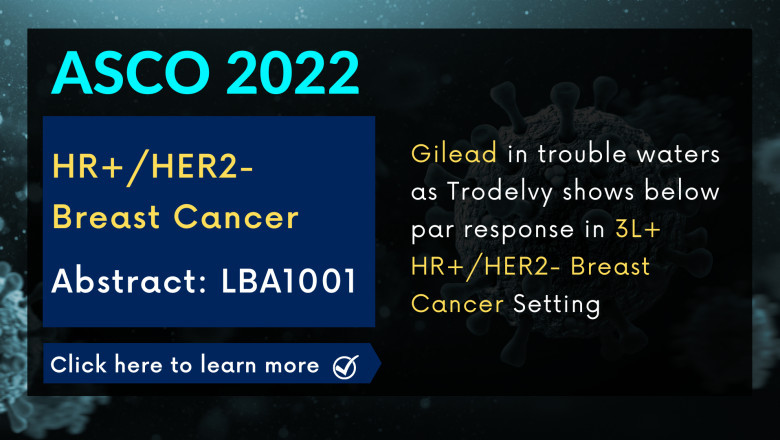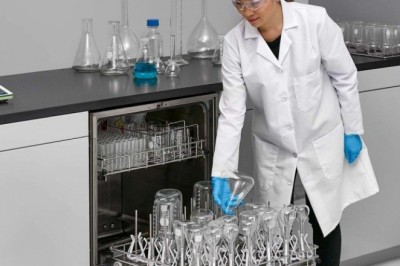Gilead in trouble waters as Trodelvy shows below par response in 3L+ HR+/HER2- Breast Cancer Setting
views

3L+ HR+/HER2- Breast Cancer: ASCO 2022
Primary results from TROPiCS-02: A phase III study of sacituzumab govitecan (SG) versus treatment of physician’s choice in patients with HR+/HER2- advanced breast cancer.
Gilead Trodelvy Mechanism of Action: DNA topoisomerase I inhibitors
The Phase III TROPiCS-02 trial puts Gilead Trodelvy against chemotherapy in heavily pretreated HR+/HER2 patients. TROPiCS-02 enrolled patients with HR+/HER2- metastatic breast cancer who were refractory to or relapsed after at least 2 prior systemic chemotherapy regimens for metastatic disease, including at least 1 prior anticancer hormonal treatment and at least 1 CDK4/6 inhibitor administered in the metastatic setting.
At a median follow-up of 10.2 months, the median progression-free survival (PFS) was 5.5 months with Trodelvy vs. 4.0 months with the investigator’s choice chemotherapy. Specifically, at 6 months, 46% of patients who received Trodelvy (n = 272) were alive without worsening disease compared with 30% who received chemotherapy (n = 271). At 12 months, the PFS rates were 21% vs. 7%, respectively.
The result of a survey done by RBC Capital Markets with 36 breast cancer-treating oncologists revealed that 92% of doctors said they wanted to see a PFS advantage of at least two months. Moreover, the patient typically lives about six to seven months without disease worsening while on chemotherapy in this setting. The 1.5-month median progression-free survival benefit achieved by Trodelvy over chemotherapy might be statistically significant. Still, it will be tough to argue that this represents a real breakthrough for these breast cancer patients, and the oncologists will be less inclined to prescribe the drug now.
The overall survival (OS) data were not mature at the analysis time; the Trodelvy breast cancer arm generated 13.9 months of median OS versus 12.3 months for the chemotherapy arm. The company said it had seen a favorable trend in the data suggesting Trodelvy could extend patients’ lives, but we have to wait for the final overall survival data, which is expected in 2024. The RBC’s survey showed that 75% of doctors would be willing to use Trodelvy if the number reaches two months.
In terms of safety, no new toxicity signals were observed in with Trodelvy and were manageable based on observations in prior studies.
CONCLUSION
Gilead bought Trodelvy (sacituzumab govitecan) in its USD 21 billion acquisition of Immunomedics in 2020; the drug is currently in use for triple-negative breast cancer (TNBC) after two prior. But Gilead's aiming to move Trodelvy up the TNBC treatment line, but it is also eyeing a bigger patient pool in HR+/HER2− breast cancer—an opportunity that could be worth USD 2 billion. The company highlighted the broad potential for Trodelvy across multiple tumor types and lines of therapy, and the company plans to initiate 13 more Trodelvy trials through 2023, including four more in 2022.
The future of Gilead Trodelvy looks weak in HR+/HER2− Breast cancer, and it is attributable to the below-par results in the TROPiCS-02 study. But this is not the only reason; the results of Enhertu in the HER2 low group will also be presented. Traditionally, patients with low HER2 expression levels have been characterized as HER2-negative, suggesting a patient overlap between Enhertu and Trodelvy. Moreover, both TROPiCS-02 and Destiny-Breast04 recruited late-line patients whose tumors scored 1+ by immunohistochemistry, or IHC2+ with a negative in-situ hybridization (ISH) score an important overlap, and the one difference is TROPiCS-02 included IHC 0 tumors. In the RBC survey among doctors, an average of 39% of HR+/HER2- patients actually fit Enhertu’s HER2-low description.
Enhertu is expected to perform strongly in the HER2 low segment, which will leave a niche segment for Trodelvy (IHC 0 tumor patients). AstraZeneca and Daiichi Sankyo have already said that both PFS and OS endpoints were hit, and the trial has won a plenary presentation spot.
Gilead, in its Q1 2022 results based on the TROPiCS-02 data, took a $2.7 billion impairment to reflect the likelihood of a delayed launch of TRODELVY for third-line plus HR+/HER2− breast cancer in the United States, as well as Europe and the possibility of a reduced market share in late-line patients given the emerging competitive landscape. This shows that the company was aware of this, and it seems that they are not in a hurry to file a regulatory application for Trodelvy approval. Currently, the Gilead Trodelvy price of intravenous powder for injection hziy 180 mg is roughly $2,314 in the US for a supply of one powder for injection, depending on the pharmacy.
Companies- Gilead, Sanofi, AstraZeneca, Eli Lilly, Radius Health, Sermonix Pharmaceuticals, Roche, Veru Pharma, and others.
Latest Pharmaceuticals Market Research Reports 2022 by DelveInsight
Medical Marijuana Market | Sarcopenia Market| Tourette Syndrome Market | Oncolytic Virus Cancer Therapy Pipeline | Shigellosis Market | Myopia Treatment Devices Market | Urology Ultrasounds Devices Market | Viscosupplementation Devices Market | Oncolytic Virus Cancer Therapy Pipeline | Inflammatory Pain Market | Venous Thromboembolism Market | Cannabis Use Disorder Market | Sepsis Market | Neurodermatitis Market | Neuroendocrine Tumors Market | Microscopy Device Market | Surgical Mask & Respirator Market | Radiodermatitis Market












